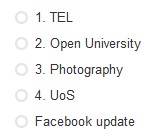... going paperless... is that there's nothing like a good scribble on a piece of paper to get your thoughts together.
Actually, that's far too simplistic, but I have been trying my hardest for the past couple of months to go paperless. The 'going paperless' tools I've been using are as follows:
1. PC
2. MacBook Pro
3. iPad
4. iPhone
5. HTC Desire
Now, as I said above, I do love a good scribble on paper. And I'm also one of those people who write 'in
hieroglyphics' (as other people tend to describe it!). In other words, I can do shorthand. As a result, the gap between an idea or a comment entering my ears and onto paper is very very small. I'm also a bit of a
soft systems person too. Present me with a complex problem and within minutes you'll be laughing at my stick people (who always have bobbly feet), lines, arrows, thought bubbles as I get to grips with trying to understand what I see in front of me. I can spray diagram my way out of most situations quicker than you can say 'the exit's over there you can stop doing a spray diagram now...'
Going without paper was tough.
Very tough.
The first few weeks of not using pens and paper I physically had to stop myself from taking a notepad around with me. Instead, I diligently noted everything down in
Evernote which, after a lapse of a couple of years where I didn't use it, I've been enjoying rediscovering its loveliness. From pictures to audio to text and more, it sat happily on my PC, MacBook, iPad, iPhone etc... waiting for notes to head its way. And it's been great. However, the funny thing is that note taking on an iPad, for example, requires a different level of concentration to just taking shorthand notes. With shorthand I don't have to think about how I'm recording what's being said. It's the difference between listening to words being spoken and hearing the letters read out of a word you have to piece back together. You just listen. With the iPad I found that part of my brain became disengaged as I struggled to touch type with no physical keyboard.
Eventually, this worked okay - my spelling became atrocious, I hated the shift key and its location next to the letter 'a' and auto-correct produced plenty of on-screen comedy for me to sort out later. But it worked. But I still wasn't listening in the way I'd listened before.
I could spray diagram, but instead of drawing, scribbling, adjusting and annotating as before, I had to glue spray diagrams together. The bubbles wouldn't behave themselves, moving about the screen with a steely determination to thwart my order. Eventually, they would look pretty and presentable - but you know what? I could have done that before. Sketching things out roughly using my pen and pad, and then putting the next draft into whichever mind mapping tool did most of the things I wanted. The software inhibited my thinking by conforming it to the order *it* imagined I was after. What was quick and dynamic became laboured and laborious.
What else went paperless? Well, my 'to do' lists also went electronic. My habit of sitting down first thing and creating the day's to do list in my notepad disappeared and instead, I added tasks as I went to my
Google Tasks. Actually, this has been a goodie in lots of ways. I can link things to my
Google Calendar... can create tasks from emails within
Gmail. Yup. It's worked nicely. Especially since Google Apps landed at both of the institutions where I work. But there's something about physically creating a list and physically crossing things out which a little click doesn't capture. Isn't that sad? The 'all ticked off' satisfying flourish of a pen across the list as another item disappeared. Sanitised *clicks* as my 'to do's' became 'to done' wasn't quite the same.
I did, on the other hand, love
Dropbox even more than before as my notepad... sorry... iPad... moved from being simply the here and now (and a few scribbles before), to being all of that and my entire filing system and document store as well. Plus, syncing between multiple devices was easy. And the joy of not having to lug a stack load of meeting papers across the campus was something to treasure!
So... where am I now with paperless? I have to admit (and given that the image above was me diagramming a problem just yesterday!), that I'm in 'compromise land'.
Going paperless is perfectly possible. Going paperless is great.
Going 'almost paperless'.. well... that works much better for me. That said, shorthand seems to be a dying art and diagramming will become much easier as software becomes increasingly fluid and user-centred. I can see a (nearly) paperless future. Even for me. My petty issues, such as they were, will be non-issues in the future.
Yet... there's nothing like a good scribble.

















